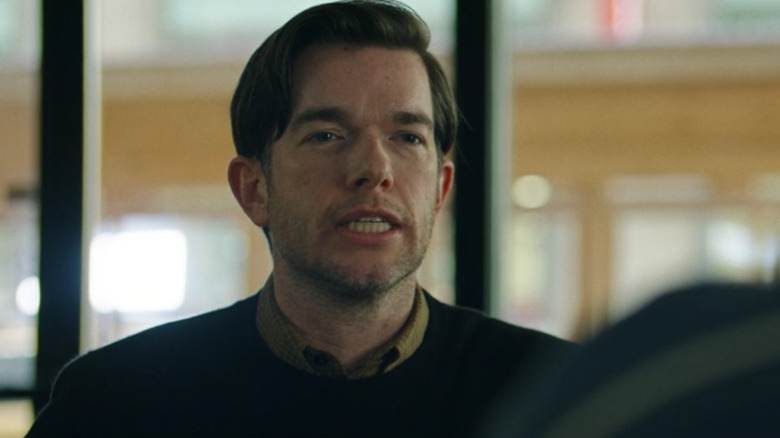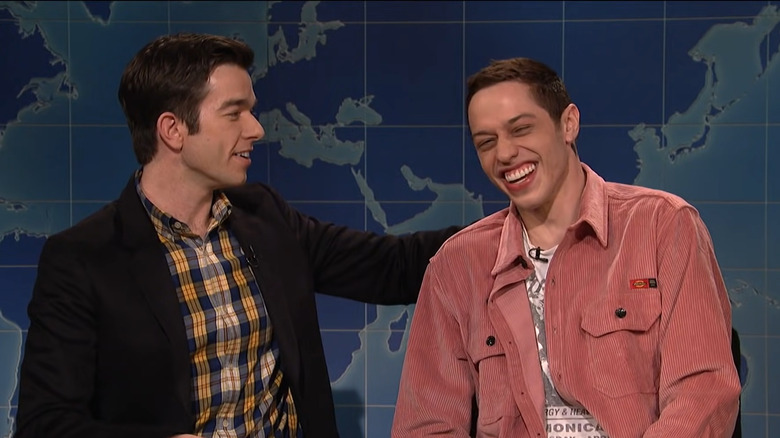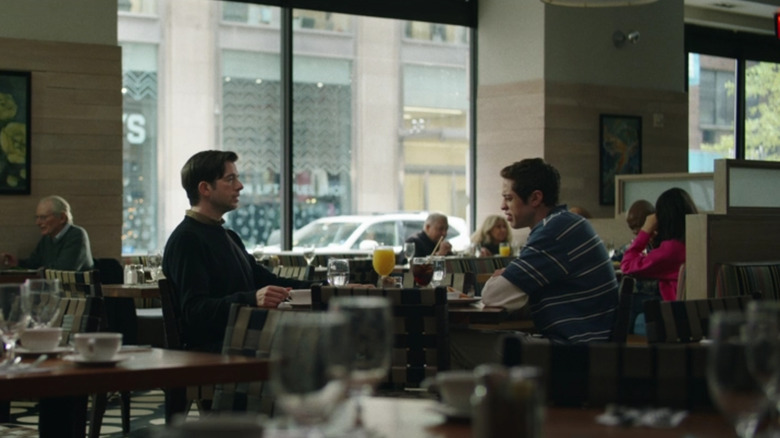
It's not uncommon for comedians to have their own shows where they basically play themselves, but Pete Davidson's "Bupkis" goes the extra mile. The show doesn't just play around with the public perception of who Pete Davidson is -- it directly comments on his real-life events with a specificity that Larry David has only occasionally dared.
For example, the show's sixth episode features Pete shooting a movie where his character gets his face blown up ten minutes in, a clear-cut commentary on Pete's real-life role in "The Suicide Squad." The director tells Pete how he asked his kids which actor they wanted to see get shot in the face and the kids immediately said Pete Davidson, which is darkly reminiscent of a joke that was told a lot in the aftermath of that movie. People on the internet have a lot of mean things to loudly say about Pete, and unfortunately, it seems like Pete's listened to a lot of it.
In "Bupkis," working on that "Suicide Squad" stand-in movie is what sends Pete spiraling -- by the next episode, "Borgnine," drugs have taken over his life to the point where he decides to go to rehab again. But before he does, he has a little conversation with his old friend John Mulaney, who famously got out of rehab himself not too long ago.
Once again the line between the actor and the character is blurred, as so much of what Mulaney says matches up perfectly with what we know is true of him in real life. Most fascinating, of course, is their discussion of the famous internet theory that Pete's the one who caused Mulaney's famous relapse.
Is Pete To Blame? (No.)

Back in January 2019, the two comedians did a Weekend Update segment together, one in which they talked excitedly about Clint Eastwood's newest movie, "The Mule." It was a much-beloved segment at the time, for a couple of reasons. The first was that Pete Davidson had made a concerning post on Instagram in December 2018 where he expressed suicidal intent, and this segment was one of the first public appearances where viewers could tell he was doing okay again.
The second was that the two comedians made an odd pair -- John Mulaney was (at the time) a straight-laced comedian who joked about how much he loved his wife and how he was afraid to even get a flu shot, whereas Pete was famous for being edgy and doing a ton of drugs. This was the dynamic they were going for. Mulaney even talks about how he tried to teach Pete that having a "sober, domestic life" was possible for people in the entertainment industry.
It's the sort of line that was funny at the time, but depressing in retrospect. Not only did Mulaney's relapse really undercut the idea that sobriety and stability are achievable goals, but the timing of it all made Pete look like the bad influence friend who dragged Mulaney off the wagon. Luckily, both comedians have confirmed — first in Mulaney's recent stand-up special, "Baby J," and again in "Bupkis" — that this was not the case.
Mulaney will be the first to tell you that he himself is the only one responsible for his relapse, but he'll also begrudgingly admit that the theory's pretty convincing. "I understand why they think that," his character says to Pete in this "Bupkis" scene, and the conversation only gets more meta from there.
Fact Or Fiction?

"There's theories online that we've swapped souls," John Mulaney says, and sure enough, those theories do exist. "It makes a lot of sense," he continues. "I don't personally believe in the theory, but it's well-researched and footnoted." After discussing the idea that they've Freaky Friday'd with each other, Mulaney then comments on Pete Davidson's absurd life in a way that any regular member of the Live From New York subreddit should be familiar with. We worry about Pete, but we're also constantly amazed by how wacky and eventful his life looks from the sidelines.
This brings the two to the core of the conversation, which isn't particularly funny at all: Pete wants a "regular type life," and Mulaney bluntly tells him he isn't made for that. "People don't want it from you, first off," Mulaney says, "and second, I don't think you want it." They both talk about how incapable they are of being normal and stable, how Pete will always be the troubled guy everyone worries about, and how Mulaney will always be having a "f***ing crisis" on the inside, despite seeming happy and stable on the outside. (The conversation also functions as a "Heat" homage, but that's almost beside the point.)
Of course, this is all a fictional conversation. There are lines here that are clearly there for comedic effect. Still, the things they say seem designed to make us wonder, how much of this is real? Is any of it real? Is most of it? There's no way to know for sure, and that seems fitting. Despite how much we've heard about the two comedians in the news over the past few years, we don't actually know Mulaney and Davidson. But through this show's eight funny, tragic, absurd episodes, "Bupkis" lets us imagine that we do.
Read this next: 12 Underrated Sitcoms That You Should Check Out
The post Why John Mulaney's Bupkis Appearance is a Dark Treat for SNL Fans appeared first on /Film.
0 Comments